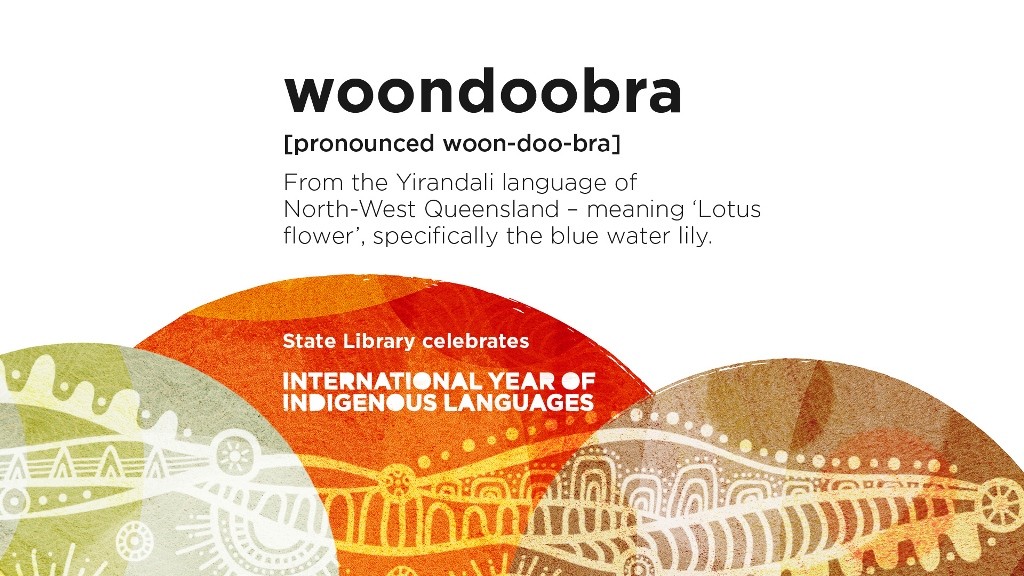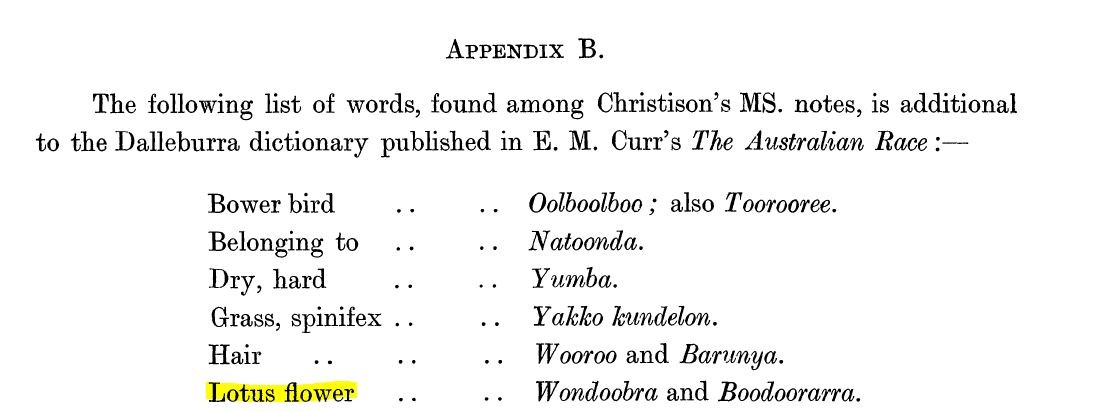2019 International Year of Indigenous Languages: Word of the Week - Week Fourteen.
By administrator | 2 April 2019
As part of State Library's commitment to the 2019 International Year of Indigenous Languages, we will be promoting a 'word of the week' from one of the 125+ Aboriginal and Torres Strait Islander languages and dialects from across Queensland.

State Library's IYIL2019 Word of the Week: Week 14.
This week’s word is woodoobra , from the Yirandali language of North-West Queensland, particularly the region around Hughenden - it means 'lotus flower' and is believed to refer to the Blue Water Lily. The different species of water lilies were a source of food for many Aboriginal groups, as the stalks were chewed and seeds were edible.

Dalleburra additional words, Bennett, M. M. (1927).
This week's word is sourced from an 1860's wordlist collated by Robert Christison from Aboriginal workers on Lammermoor Station. A second list of words from the Upper Flinders River was also collated by Curr in his publication The Australian race: its origins, languages, customs, place of landing in Australia and the routes by which it spread itself over that continent.
Yirandali is also known as Jirandali, Yirandhali and also Dalleburra. Dalleburra is believed to be the name of the clan which lived on Lammermoor Station. Yirandali is undergoing an active community language revival and is one of the languages supported by the North Queensland Regional Aboriginal Corporation Language Centre.
State Library of Queensland invites you to celebrate the 2019 International Year of Indigenous Languages as we raise awareness of the rich diversity of Queensland’s Aboriginal and Torres Strait Islander languages.
Join the conversation as we post a new word for each week!
Week Fourteen 2-8 April 2019.
#IYIL2019 #IYIL #IY2019WordoftheWeek #SLQIndigenousLanguages
Desmond Crump
Indigenous Languages Coordinator, State Library of Queensland
State Library of Queensland Aboriginal and Torres Strait Islander Languages Webpages
State Library of Queensland Aboriginal and Torres Strait Islander Languages Map
UN IY2019 Links
UN International Year of Indigenous Languages webpages
UN International Year of Indigenous Languages Resources
References
The word of the week has been sourced from the following items in the State Library collections.
Source: TR1867 Christison Family Papers and Lammermoor Station Records 1857-1989.
Bennett, M. M. (1927) "Notes on the Dalleburra Tribe" in Journal of the Royal Anthropological Institute, V. 57. P 572.9943 BEN
Further Reading
Other materials in the State Library collections relating to Biyay and neighbouring languages include the following:
Bailey, F. M. (1909) Comprehensive catalogue of Queensland plants, both indigenous and naturalised. To which are added, where known, the aboriginal and other vernacular names; with numerous illustrations, and copious notes on the properties, features, &c., of the plants. G 581.9943 1909
Bennett, M. M. (1927) "Notes on the Dalleburra Tribe" in Journal of the Royal Anthropological Institute, V. 57. P 572.9943 BEN
Brayshaw, H. (1990) Well-beaten paths: Aborigines of the Herbert-Burdekin, North Queensland. G 306.0899915 1990
Breen, J.G. (1990) Salvage Studies of Western Queensland Aboriginal Languages. J 499.15 bre
Curr, M. "Upper Flinders, Hughenden, Dutton River, etc." in Curr, E. M. (1887) The Australian race: its origins, languages, customs, place of landing in Australia and the routes by which it spread itself over that continent. RBJ 572.994
Tindale, N. B. (1974) Aboriginal tribes of Australia: their terrain, environmental controls, distribution, limits and proper names. Q 994.0049915 tin
Comments
Your email address will not be published.
We welcome relevant, respectful comments.